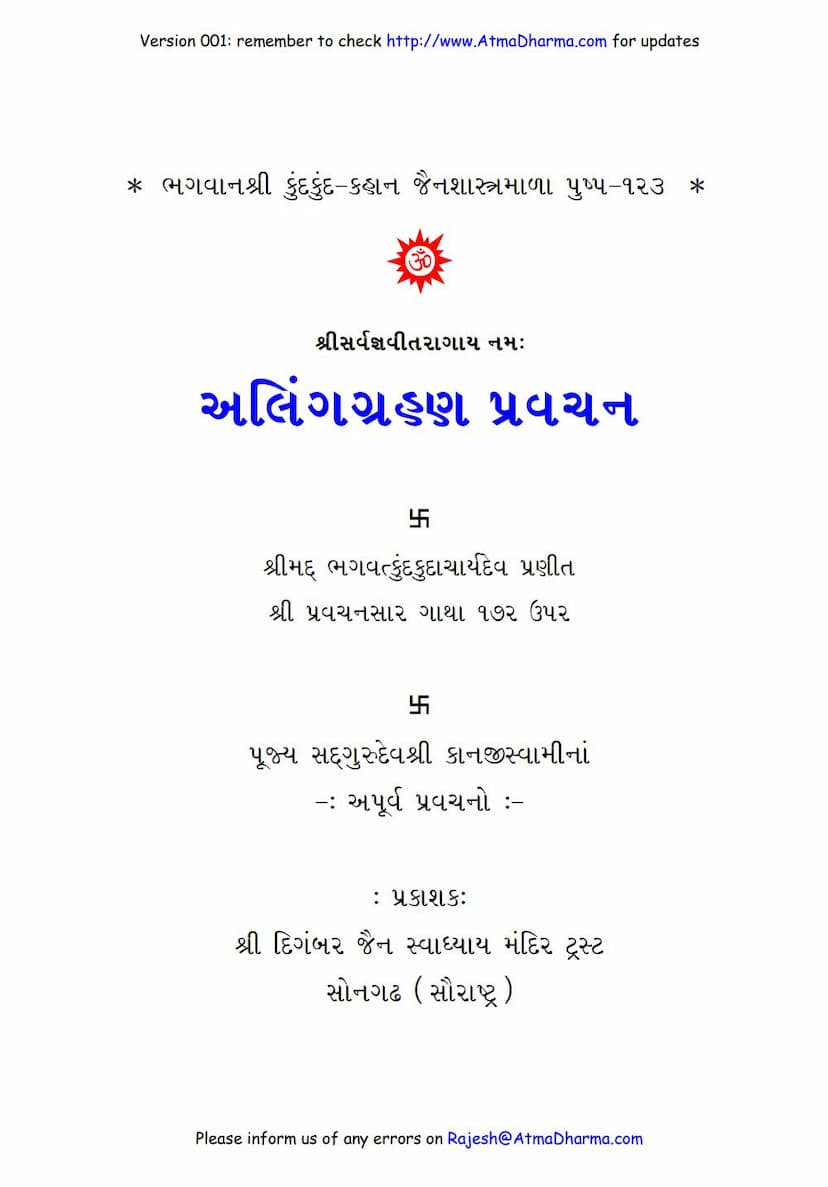Alinggrahan Pravachan
Added to library: September 1, 2025

Summary
This Jain text, "Alinggrahan Pravachan," is a discourse by Pujya Gurudev Shri Kanji Swami based on Verse 172 of Acharya Kundakund's "Pravachansar." The core theme revolves around understanding the true nature of the soul (Atma) by defining what it is not – specifically, what it does not take or grasp (alinggrahan).
The discourse meticulously deconstructs the soul's nature by negating external and even internal conventionally perceived attributes:
Key Characteristics of the Soul (Atma) as Described:
The soul is characterized as being "alinggrahan," meaning it does not grasp or is not grasped by any "ling" (sign, characteristic, or means of identification). This is elaborated through twenty "bols" (points or aspects) derived from the term "alinggrahan":
- Absence of Sensory Qualities: The soul is devoid of taste, form, smell, and sound. It is not perceived through the senses (alinggrahan means not grasped by senses).
- Not Perceived by External Signs (Linga): The soul cannot be identified by external physical attributes, bodily forms, or any external symbols or marks. These are considered signs of the physical body (pudgal), not the soul.
- Beyond Physical Form: The soul has no specific shape or form. It is not defined by the dimensions or configurations of the body.
- Non-Sensory and Non-Intellectual Understanding: The soul knows and perceives through its own inherent nature, not through the senses or the mind. The text refutes the idea that knowledge is derived from sensory organs like eyes, ears, or mind. It emphasizes that true knowledge is an intrinsic attribute of the soul.
- Incorporeal and Indivisible: The soul is not physical, cannot be grasped by physical means, and is not subject to physical limitations or transformations.
- Free from Qualities of Pudgal (Matter): The soul is distinct from matter and its associated qualities like color, taste, smell, touch, and sound.
- Not Defined by Actions or Reactions: The soul is not the doer of actions related to the physical body, speech, or mind. While external circumstances may exist, the soul's true nature remains untouched.
- Beyond Cause and Effect of Matter: The soul's existence is not dependent on external factors like semen and menstrual blood (shukra and artav) for its being.
- Not Defined by Life-Force (Prana): The soul is not sustained by physical breaths, vital forces, or the lifespan of the body. It is the very essence of consciousness.
- Not Identified by Physical or Emotional States: The soul is not defined by sexual characteristics (male, female, neuter – ved), physical appearances, or the ups and downs of emotions (like happiness and sorrow).
- Not Influenced by External Marks or Symbols: External religious symbols, ascetic practices, or affiliations do not define the soul. The soul is not identified by the nakedness of the Digambar monks or their utensils like a peacock feather or water pot.
- Unattached to Qualities and Modifications: The soul, in its essence, is not affected by its inherent qualities (like knowledge, perception) or their transient modifications (parinati). It remains distinct from them. The true nature of the soul is to be aware of itself.
- Unchanging and Eternal: The soul is eternal and unchanging, not subject to birth, death, or transformation.
- Independent and Self-Sufficient: The soul's knowledge and perception are not derived from external sources, nor are they dependent on them. The soul is not a mere instrument for external knowledge or perception.
- Not a Product of External Factors: The soul's existence or its inherent qualities are not created or influenced by external factors like divine pronouncements, scriptures, teachers, or even one's own actions like charity or austerity.
- Incapable of Being Stolen or Diminished: The soul's true nature and inherent knowledge cannot be taken away or diminished by external forces or circumstances.
- Free from Blemish or Impurity: The soul is inherently pure and untainted by any form of defilement or impurity.
- Not Attached to Material Wealth or Relationships: The soul is not defined by possessions, family, or social status.
- Not a Consumer of External Objects: The soul does not consume or experience external objects through the senses. The perception of experiencing objects is considered an illusion of the ignorant.
- Not Defined by Union or Separation: The soul is neither formed nor influenced by the union or separation of physical or karmic elements.
- Not Subject to Dependence or Independence: The soul's nature is inherently independent and not dependent on any external factor for its existence or functioning.
Core Message:
The entire discourse emphasizes that the path to liberation (Moksha) lies in understanding and realizing this intrinsic, pure, and self-sufficient nature of the soul. This is achieved through introspection, self-awareness, and detachment from all external and internal conditions that are not the true essence of the soul. The "alinggrahan" nature of the soul is the key to recognizing its unconditioned and absolute reality. The teachings encourage the seeker to direct their attention inward, to their own pure consciousness, and to understand that true bliss and knowledge reside within, independent of any external "ling" or condition. The ultimate goal is to identify with this unconditioned, pure soul, leading to liberation.